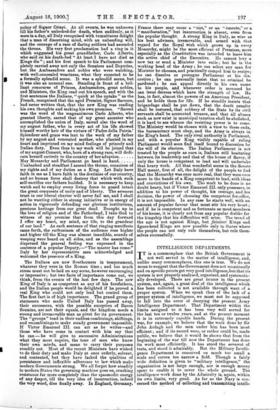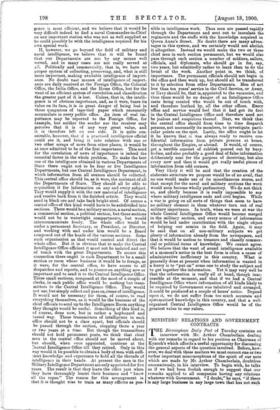INTELLIGENCE DEPARTMENTS.
IT is a commonplace that the British Government is not well served in the matter of intelligence, and, unlike many commonplaces, this one is true. We do not mean to suggest that the Government does not occasionally and on specific points get very good intelligence, but that its system is not properly analysed, organised, and systematic- ally developed. There are great /actin in the present system, and, again, a great deal of the intelligence which has been collected is not available through want of a proper system. When we speak thus of the lack of a proper system of intelligence, we must not be supposed to fall into the error of decrying the present Army Intelligence Department. That Department within the limits assigned to it has been very well served for the last ten or twelve years, and at the present moment it is in extremely capable hands. During the present war, for example, we believe that the work done by Sir John Ardagh and the men under him has been most efficient ; and if its record were, or rather could be, made public, we believe that it. would be shown that from the beginning of the war till now the Department has done its work most efficiently. It has stood the severest of tests, and stood it admirably. But the Military Intelli- gence Department is conceived on much too small a scale and covers too narrow a field. Though a fairly wide definition is given to "military intelligence," the organisation is not large enough, nor is enough money spent to enable it to cover the whole ground. The intelligence work done by the Admiralty is, again, within its own limits, very good. As far as the Navy is con- cerned the method of collecting and transmitting intelli- Bence is most efficient, and we believe that it would be very difficult indeed to find a naval Commander-in-Chief on any important station who was not as well supplied as he could possibly be with the intelligence required for his own special work.
If, however, we go beyond the field of military and naval intelligence, we believe that it will be found that our Departments are not by any means well served, and in many cases are not really served at all. Politically and commercially, that is, we have no proper system of collecting, preserving, and, what is still more important, making available intelligence of import- ance. No doubt vast masses of intelligence of import- ance are daily received at the Foreign Office, the Colonial Office, the India Office, and the Home Office, but for the want of an efficient system of correlation and classification the greater part of it is lost. Unless, that is, the intelli- gence is of obvious importance, and, as it were, bears its value on its face, it is in great danger of being lost in those quagmires of tape-tied paper which necessarily accumulate in every public office. An item of real im- portance may be reported to the Foreign Office, for example, but neither the sender nor the receiver may perceive that it is of any very great value, and it is therefore left on one side. It is quite con- ceivable, however, that if a practised intelligence official could see it, and bring it into relation with one or two other scraps of news from other places, it would be at. once admitted to be of the first importance. This need for the correlation of news of importance is indeed the essential factor in the whole problem. To make the best use of the intelligence obtained in various Departments of State there ought not to be four or five Intelligence Departments, but one Central Intelligence Department, in which information from all sources should be collected. This central office should be, as it were, the assistant of all the Departments of State. They should all be able to requisition it for information on any and every subject. They would supply it with the raw material of intelligence and receive back from it the finished article. They would send in black ore and take back bright steel. Of course a central office of this kind would have to be subdivided into sections. There would be a military section, a naval section, a commercial section, a political section, but these sections would not be in watertight compartments, but would intercommunicate freely. The whole office would be under a permanent Secretary, or President, or Director, and working with and under him would bo a Board composed out of the heads of the various sections. Some such organisation as that would control and direct the whole office. But it is obvious that to make the Central Intelligence Office efficient it must not be isolated and out of touch with the great Departments. To secure this connection there ought in each Department to be a small section or room whose business it would be to forage, as it were, for the central office, to have access to all despatches and reports, and to pounce on anything new or important and to send it to the Central Intelligence Office. These small sections, composed at the most of a couple of clerks, in each public office would be nothing but trans- mitters to the Central Intelligence Office. They would not use, but simply collect and pass on, items of intelligence. It would not be necessary for them, of course, to read everything themselves, as it would be the business of the chief officials to send up to the Intelligence Room anything they thought would be useful. Something of this kind is, of course, done now, but in rather a haphazard and casual way. These transmitters of intelligence in each office should not be a class apart, but officials should be passed through the section, stopping there a year or two years at a time. But though the transmitters should not hold permanent posts, we think that chief men in the central office should not be moved about, but should, when once appointed, continue at the ..7,entral Intelligence Office till they retired. Only in this way would it be possible to obtain a body of men with suffi- :lent knowledge and experience to hold all the threads of intelligence in their hands. At present the men in the Military Intelligence Department are only appointed for five years. The result is that they leave the office just when they have thoroughly learnt their business and " know all the ropes." The reason for this arrangement is that it is thought wise to train as many officers as pos- sible in intelligence work. Thus men are passed rapidly through the Department and sent out to inoculate the regiments and the staffs with the knowledge acquired in Queen Anne's Street. No doubt there are many advan- tages in this system, and we certainly would not abolish it altogether. Instead we would make the two or three chief men in each section permanent, but we would also pass through each section a number of soldiers, sailors, officials, and diplomats, who should go in for, say, two years, but admittedly rather to learn than to do the brunt of the work. Another point is, we think, of importance. The permanent officials should not begin in the office and then work up, but should all be transferred to it by selection from other Departments. Men of not less than ten years' service in the Civil Service, or Army, or Navy should be, that is, appointed to the vacancies, and thus there would be no danger of an Intelligence Office caste being created who would be out of touch with, and therefore loathed by, all the other offices. Every office and service would feel that it had got its foot in the Central Intelligence Office and therefore need not be jealous and suspicious thereof. Next, we think that the central office should from time to time despatch persons, not necessarily its members, to investigate parti- cular points on the spot. Lastly, the office ought to let it be known that it was always ready to receive con- fidential information from private persons at home, throughout the Empire, or abroad. It would, of course, get a terrible amount of rubbish poured out by busy- bodies, and also probably a good deal of false information deliberately sent for the purpose of deceiving, but also every now and then it would get really useful pieces of information from odd corners.
Very likely it will be said that the creation of the elaborate structure we propose would be of no avail, that no one would make use of its miscellaneous stores, and that except for the naval and military sections the work would soon become wholly perfunctory. We do not think so, and chiefly because it is really impossible to say where military intelligence ends and civil begins. While a war is going on all sorts of things that seem to have no military element in them whatever turn out of real military importance. In truth, when we were at war the whole Central Intelligence Office would become merged in the military section, and every source of information would be laid under contribution with the single object of helping our armies in the field. Again, it may be said that on all non-military subjects we get plenty of information already from the newspapers, and that it would be useless to treasure and classify commer- cial or political items of knowledge. We cannot agree. We believe that the want of sound intelligence available at a moment's notice in the best form is often a cause of administrative inefficiency in this country. What is generally done at present when information is wanted in a hurry is to "put on" some one to study the subject and to get together the information. Yet it may very well be that the information is really all at hand, though inac- cessible at the moment, and that if we had a Central Intelligence Office where information of all kinds likely to be required by Government was tabulated and arranged, it could be produced at a couple of hours' notice. Depend upon it, we do not suffer from too much accurate and systematised knowledge in this country, and that a well- organised Central Intelligence Office would be of the greatest value to our rulers.



































 Previous page
Previous page